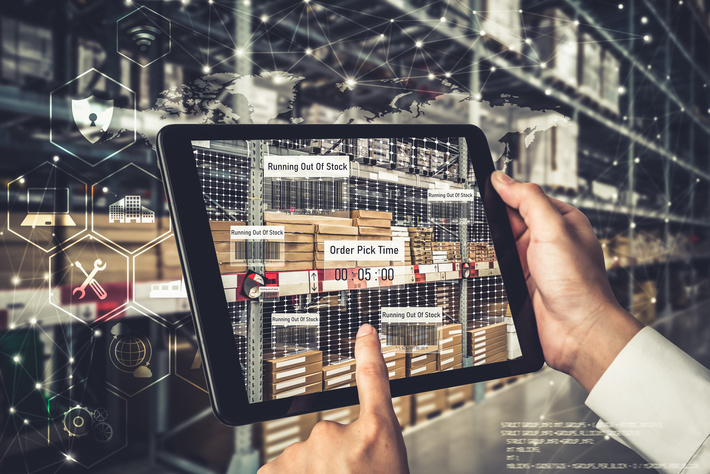
Highlights of Retail automation
In 2019, Economist Intelligence conducted a survey of more than 500 companies from eight countries. The study aimed to figure out how far organizations have progressed in automating their activities. Among other economic sectors, the report included some facts about business process automation in Retail.
More than half of respondents (51%) from different industries admitted that they actively use robotization in their work. The scale of the introduction of such technologies varies depending on the region and sector. For example, companies in the USA, France, and Germany take the lead in intensive automation. What IT solutions are the most popular in Retail? What is hindering their implementation? How soon will robots replace salespeople? Read about this in our article.
Tools for Retail automation
Automation implies the use of software that independently performs tasks, simulating human work. These tasks are usually repetitive structured activities. At the moment, the most widely used technologies are such software-based solutions as IoT and RPA, which employ Artificial Intelligence. Physical robots play a significant role as well, for example, in logistics and warehouse management.
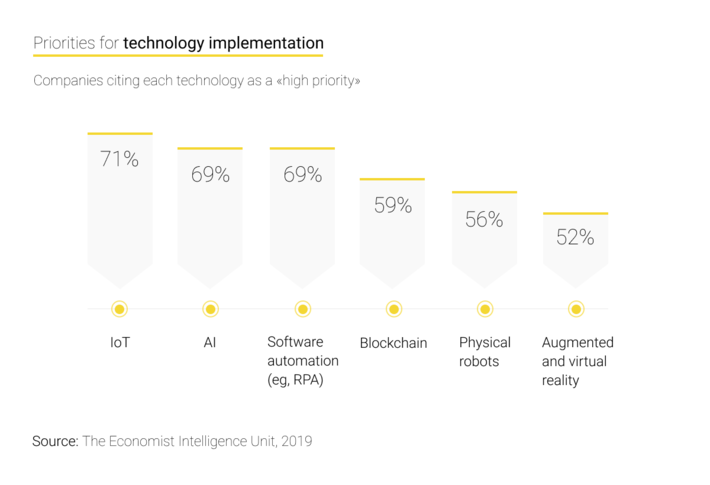
Retailers actively use the above technologies for collecting and processing data, as well as for performing predictable physical operations. According to the McKinsey Global Institute, the total automation potential of these and other activities in that industry amounts to 53%.
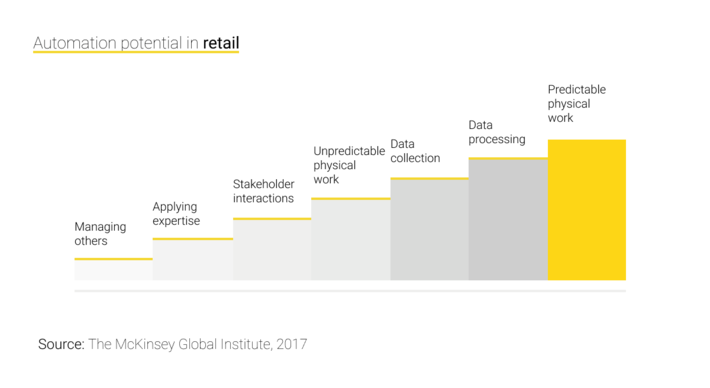
What processes to automate
Today, retailers are mostly, but not only, automating repetitive documentation tasks. Organizations apply IT solutions in the following areas:
- Invoicing and accounting
Using RPA tools enables software to generate reports, reconciliation statements, and cover letters, as well as make payments. The software processes the applications, structures IFRS data, and analyzes it. Moreover, the system keeps records of all transactions, which helps companies successfully pass financial audits.
- Customer service
As a rule, activities that involve a high level of human interaction require a combination of standard RPA and AI-driven technology. Such systems don’t just analyze information. They must be flexible to offer the necessary solutions.
One of the tools used in customer support is electronic consultants. They utilize several techniques simultaneously, including natural language processing algorithms, neural networks, and Deep Learning. Such systems are capable of self-learning, and their effectiveness only increases over time.
- Human resource management
Software successfully replaces people when performing HR tasks. In particular, such systems analyze the CVs of candidates on the Internet and select suitable ones. Robots help to onboard new employees and conduct their initial training. Such programs also draw up the letters of employment and reports, keep records of sick leave and vacations.
- Logistics
RPA tools help companies manage purchase orders. Systems automatically send notifications to suppliers, register invoices, take inventory, control the delivery terms, and more. The ML-driven programs plan routes using real-time data about the traffic and weather conditions. This helps drivers to promptly take action in order to deliver cargo as quickly as possible.
- Marketing and sales
Special platforms process customers orders, send them notifications, and respond to complaints. Predictive Analytics tools analyze customer behavior on a companys website and predict demand. Then, this software personalizes offers and adjusts prices, which helps retailers to increase the volume of sales.
- Document flow
RPA solutions help retailers to manage the vast amount of various documents. ML-based systems control expiring transactions, create and send reports, register contracts, handle emails, etc.
Software segments and analyzes information based on multiple factors. For example, it considers both historical and real-time data, the information from the currency markets, tax bases, state authorities, etc. Scott Likens, the leader of new services and emerging technologies at PwC, stated that their technologies dealt with the burden of documentation so that the staff could focus on making expert judgments.
Benefits of business process automation
For many retailers, automation marks the beginning of a digital transformation. According to Economist Intelligence, 73% of organizations are highly satisfied with the outcomes of their business process robotization. Among the most frequently named benefits of such solutions are an increase in productivity and reduction of errors. The other advantages are improved consistency of operations, increased revenue, and enhanced customer experience.
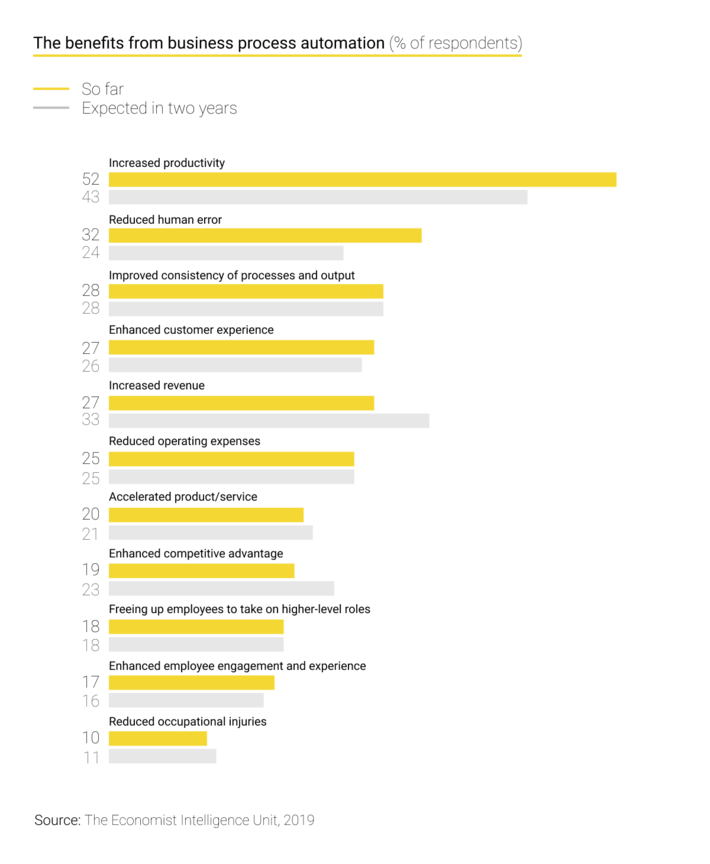
Difficulties in the adoption of new technologies
If business process automation in Retail is so beneficial, what dissuades organizations from introducing it? Among the most frequent reasons companies name are data privacy concerns, difficulties with technology deployment, and human factors. The latter include the reluctance of employees to accept changes and an insufficient level of skills.
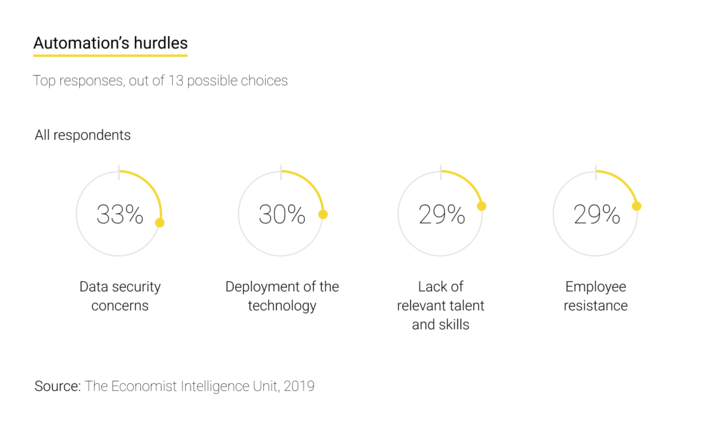
The organizations can partly remove the above obstacles by educating and training their staff members on the RPA solutions. More than half of respondents of the Economist Intelligence survey stated that automation requires the development of new skills in their employees. These abilities include problem-solving, openness to changes, and a teamwork mindset.
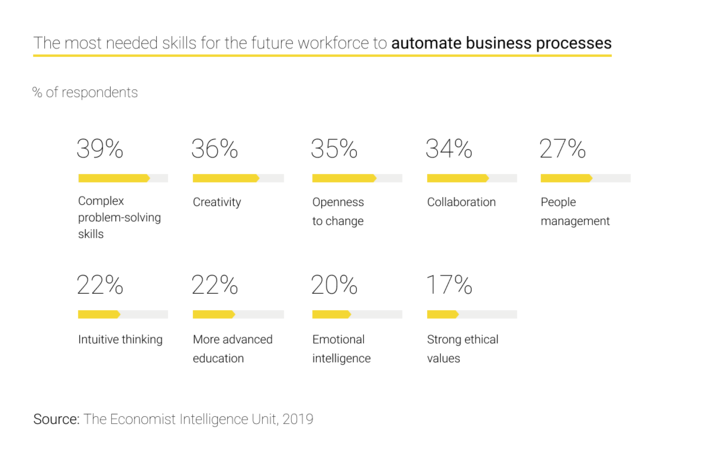
The future of automation
Despite the competitive edge that robotics gives retail companies, a lot about the future of this technology is still unknown. How far will automation progress in changing the supply chains, stock management, order handling, and interaction with customers? Will robotization limit or, on the contrary, enhance employees creativity and liberty of action? How can companies ensure data protection in the context of rapidly developing technology?
Many retailers are also asking themselves whether cutting-edge solutions will replace the human workforce entirely and how soon it will happen. McKinsey Global Institute concluded that, although machines will play a major role in all economic sectors in the near future, they will successfully perform only one-third of all the tasks. That means the employees will soon need to learn to work alongside rapidly evolving robots.
